Related Research Articles
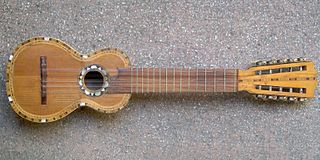
The charango is a small Andean stringed instrument of the lute family, which probably originated in the Quechua and Aymara populations in the territory of the Altiplano in post-Colonial times, after European stringed instruments were introduced by the Spanish during colonialization. The instrument is widespread throughout the Andean regions of Bolivia, Peru, Ecuador, northern Chile and northwestern Argentina, where it is a popular musical instrument that exists in many variant forms.

Andean music is a group of styles of music from the Andes region in South America.
Chilean music refers to all kinds of music developed in Chile, or by Chileans in other countries, from the arrival of the Spanish conquistadors to the modern day. It also includes the native pre-Columbian music from what is today Chilean territory.
The Music of Peru is an amalgamation of sounds and styles drawing on Peru's Andean, Spanish, and African roots. Andean influences can perhaps be best heard in wind instruments and the shape of the melodies, while the African influences can be heard in the rhythm and percussion instruments, and European influences can be heard in the harmonies and stringed instruments. Pre-Columbian Andean music was played on drums and string instruments, like the European pipe and tabor tradition. Andean tritonic and pentatonic scales were elaborated during the colonial period into hexatonic, and in some cases, diatonic scales.
Los Jairas was a Bolivian folk music group that was active in the 1960s. Their work features the charango, a stringed instrument from Bolivia.
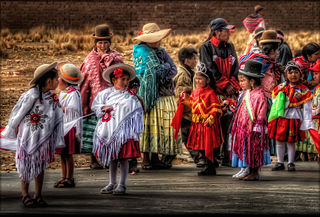
Bolivia is a country in South America, bordered by Brazil to the north and east, Paraguay and Argentina to the south, Chile to the west, and Peru to the west.
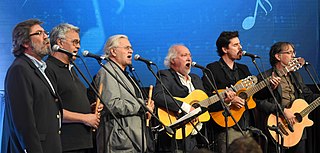
Quilapayún are a folk music group from Chile and among the longest lasting and most influential ambassadors of the Nueva Canción Chilena movement and genre. Formed during the mid-1960s, the group became inseparable with the revolution that occurred in the popular music of the country under the Popular Unity Government of Salvador Allende. Since its formation and during its forty-year history - both in Chile and during its lengthy period of exile in France - the group has seen modifications to its personnel lineup and the subject and content of its work. Controversy regarding irreconcilable differences with the current and former group directors led to the division into two distinctive Quilapayún ensembles; one in Chile (Quilapayún-Histórico) and one in France (Quilapayún-France).

Huayno is a genre of popular Andean music and dance. It is especially common in Peru, Bolivia, and Argentina, but also present in Chile, and is practiced by a variety of ethnic groups, especially the Quechua people. The history of Huayno dates back to colonial Peru as a combination of traditional rural folk music and popular urban dance music. High-pitched vocals are accompanied by a variety of instruments, including quena (flute), harp, siku (panpipe), accordion, saxophone, charango, lute, violin, guitar, and mandolin. Some elements of huayno originate in the music of the pre-Columbian Andes, especially on the territory of the former Inca Empire. Huayno utilizes a distinctive rhythm in which the first beat is stressed and followed by two short beats.

Los Kjarkas is a Bolivian band from the Capinota province in the department of Cochabamba, and one of the most popular Andean folk music bands in the country's history. Among the styles they play are Saya, tuntuna, huayno, and carnavales. The instruments they use include the charango, quena, zampoña, ronroco, guitar, and bombo.
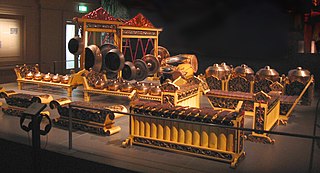
A folk instrument is a musical instrument that developed among common people and usually does not have a known inventor. It can be made from wood, metal or other material. Such an instrument is played in performances of folk music.

Poi Dog Pondering is an American musical group, noted for its cross-pollination of diverse musical genres, including various forms of acoustic and electronic music. Founded in Hawaii in 1984 by Frank Orrall, initially as a solo project. In 1985 Orrall formed the first line-up of PDP to perform its first concert; at the Honolulu Academy of Arts. The band then embarked on a yearlong Street Performance Busking tour across North America, eventually settling in Austin, Texas in 1987, where they recorded their first three albums. In 1992, the band relocated, this time to Chicago, Illinois, where they began to incorporate Orchestral arrangements and elements of Electronic, House Music and Soul music into their Acoustic Rock style. The membership of Poi Dog Pondering has evolved from album to album, with Frank Orrall being the constant since the inception.
Javier Parrado is a Bolivian classical composer, whose works have been performed in Europe, and Latin America.
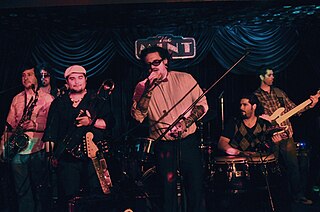
The B-Side Players are a San Diego based band that incorporate the sounds of Cuba, Jamaica, Mexico and Brazil with the funk, rock, jazz and hip-hop rhythms of their homeland. The band also drops a bit of Cumbia, gritty street Samba, Son Montuno and Jarocho into the mix. Described as War meets Lenny Kravitz by way of Ben Harper, the players have expanded their sound by playing with the likes of Harper, Ozomatli, The Wailers, James Brown, War and some of Cuba's best bands. Formed in 1994, they are signed to Jazz label Concord Music Group.
Lullaby is the eighth studio album and debut children's album by American recording artist Jewel, released on May 5, 2009 by Somerset Entertainment, through Fisher-Price Records. It is her first-ever independent release. The album has sold 37,000 copies in the United States as of June 2010.
Los Koyas is a folk music group composed of five soloists who perform musical pieces and songs of twelve Latin American countries, from the Andes to Cuba.

Muzičke paralele is the live album released by Serbian Irish folk/Celtic rock band Orthodox Celts and Serbian Latin American music band Pachamama. The album was recorded on the bands' concert in Novi Sad Synagogue, held on September 15, 1995, and self-released by the bands in 1996. The first six tracks on the album are performed by Pachamama, the following seven are performed by Orthodox Celts, and the last five are performed together by two bands.

The bandolin is a 15-stringed musical instrument in Ecuador. It is used as a rhythm and melody instrument in the Andean region of Ecuador during festivals where dancing and music are involved. It has a flat back and 15 strings in triple courses.

Yehuda Julio Glantz is a musician, composer, singer, songwriter and producer living in Jerusalem Israel. Named and recognized as Cultural Ambassador of Latin Hebrew Music from Israel to the world. Glantz is a multi-instrumentalist playing on the Charango, piano, accordion, siku, pinkillu, guitar, flute, cuatro and is also a percussionist. Yehuda has twice received the first place award in the klezmer Safed festival for his performance and compositions. In 2008, Yehuda founded the Regalim Festival in the City Center of Jerusalem. The festival takes place during both Sukkoth and Passover holidays and attracts thousands of visitors from around the world.
Tierramystica is a Brazilian folk metal band from Porto Alegre, Rio Grande do Sul, founded in 2008. The band is noted for blending heavy/power metal with elements of andean music. As an opening act, they have performed with names such as Angra, Sepultura, Symphony X, Epica, Paul Di'Anno and Scorpions.
Entrama is a Chilean music group that since its inception in 1997 develops instrumental music, fusing styles such as Latin American music of folkloric origin, with jazz and classical music, mainly using compositional techniques derived from the latter. It has also been cataloged as World Music. According to the specialized critics they have been called as popular musicians for refined and demanding listeners.
References
- ↑ Ride Around the World: A Cowboy Adventure
- ↑ Southwestern University Sarofim School of Fine Art
- ↑ Mid-Texas Symphony Archived July 27, 2011, at the Wayback Machine
- ↑ St. Andrew's Episcopal School Archived June 28, 2011, at the Wayback Machine
- ↑ Chaski